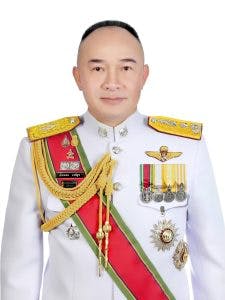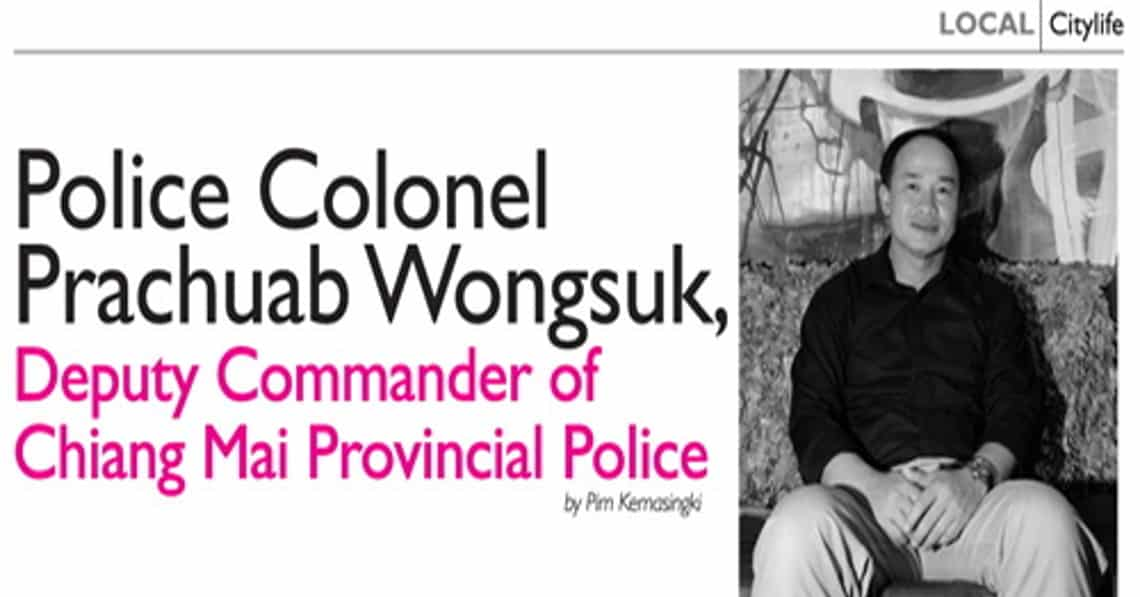
Pim:
Do you enjoy being a policeman?
Pol. Col. Prachuab:
Absolutely. Being a policeman is like being a spittoon in a palace [an old Thai saying], every problem lands on our door and it is challenging and I enjoy solving them. I love helping people who are in trouble.
Pim:
What do you feel about the general public’s opinion that the Thai police force is corrupt?
Pol. Col. Prachuab:
Every country has corruption, and we have it too. It is hard to control and we all know it is there, we just have to fix it one case at a time. We also have to study the roots of the problem: greed, lack of money, power…In Thailand these days there are many anti corruption organisations. There is more scrutiny. There are many ways of catching these corrupt crooks and punishing them. We no longer hold corrupt people up in society, we are now condemning them. Before the gun was power, then money was power. I believe that now connection is power. Not bad connection of nepotism, but good connection like social networking. People helping each other, information flow, knowledge. I believe in friendship and optimistic partnership. Not cynical and corrupt connections, but being good, being positive, being helpful, we can all achieve success and power if we work together and do good.
Pim:
What are you most proud of in your career?
Pol. Col. Prachuab:
It was pretty great to have been given the best public relations personality in 2001 and in 2008 I was voted man of the year. But mostly I am proud of my work in developing personnel, training police, helping them to be better at their jobs, make them good people, help them to gain respect and bring new generations of police up into men and women who society can respect.
Pim:
What problems are you concerned about these days?
Pol. Col. Prachuab:
The economy is a concern, we have to facilitate tourism more. We have to make sure that they are safe, confident to be here, that they are welcome and experience the best we have to offer. I am also concerned with pollution, and other issues such as tall buildings, over building, traffic jams, noise pollution.
Pim:
Noise pollution is something people are creating, ahem, noise about, what can you do to help?
Pol. Col. Prachuab:
I believe that we have to stick to rules. Like noise pollution, which actually comes under the auspice of the health organisation and the municipality. As police, we don’t have machines to measure noise pollution, therefore we are often – unless in extreme and obvious situations – unable to enforce the law. However, we are working with relevant bodies to come up with new zoning laws. We have to involve all parties. No one wants to bankrupt businesses, but they must work with us to find a middle road. Like when we cleared the old moated city of petrol stations, that scheme was only successful when we involved the owners of the stations.
Pim:
Is jurisdiction one of the major problems?
Pol. Col. Prachuab:
On one hand yes it is. It is confusing for the public when they don’t know who to report to and who is in charge of what. But the good news is that organisations are working closer together than they ever have before. We have better connectivity, more enlightened and modern thinking personnel, and we understand now that we can’t stand alone, we have to work together. Of course with so many organisations with so many rules it is very difficult: each has its own regulations and agendas. The thing I believe in the most and what is most effective is continuity. As long as we don’t go on trends, knee-jerk reactions, or quick orders, we will get there in the end. In the old days the police had more power. Today things are splintered and more organisations have more responsibility, this is good as it means we are not invincible. Instead of one driver, there are many, all going in the same direction. It is not just about checks and balance, it helps gain momentum and you have more intelligent input. This is the continuation of the development of Thai society. The police used to have too much power and it is good now that we have less. We have to go to court to get warrants, we have to be answerable to the media, we have stops in place. Sometimes red tape is still a problem, and this is in a way because no one has absolute power anymore, but at the end of the day it is up to training good personnel. The more we have and the better qualified the easier the path will become.
Pim:
How do you believe we should fight corruption?
Pol. Col. Prachuab:
Education is key and it starts with the children. If you ask why so many children think corruption is OK, it is because they see it every day and they don’t see any consequence, therefore they accept it.
Pim:
If you had unlimited budget and support what would you want to do?
Pol. Col. Prachuab:
I would work on tourism related crimes, public transportation and mostly safety and convenience. I would love to put CCTV all over the city to deter crime. People will know that they can’t get away with things.
Pim: Do you believe that the police are underpaid?
Pol. Col. Prachuab:
I don’t think the pay scale is a problem. But the problem is the frills. We have to purchase our own uniforms, our own guns, often our own vehicles, even desks, chairs and computers. This is simply not possible on our salary. There are 4000 police in Chiang Mai province, 1000 of which are in the Muang District, the budget as it is simply can’t supply them with what they need.
Pim:
What is your vision for the perfect police force?
Pol. Col. Prachuab:
I want all police to be professional. To work as a full career, to do their jobs and not get involved with anything that is not their business. To be proud of being good and helping people. To take care of society and keep peace.
Pim:
Since we are sitting off Nimmanhaemin, what do you think you can do to fix the growing problems here?
Pol. Col. Prachuab:
This is the fastest growing economic microcosm in the city. And this comes with many problems. I would like to ban all parking along the roads. International laws would say that you can’t turn right when coming out of a soi, only left. I wish we could enforce that too. Even the moat used to be two ways, and we managed to get people to accept the new one way system. There is much resistance to change among business owners along this road, so we have to work carefully and slowly.
Pim:
Is crime a serious problem here?
Pol. Col. Prachuab:
Not really. Some theft, but pretty minor when compared to elsewhere.
Pim:
Are you worried about the mobs?
Pol. Co. Prachuab:
These hot headed radicals have really gone underground now. So for now it is peaceful. I think that we are learning that the way to show discontent in society is not to be violent, that is not acceptable anymore. That is why there are many groups now having discourse, everyone is aware that this is the way; the old way didn’t work. It is now proven that the majority of people in Chiang Mai didn’t want that kind of protest. Time has proven that we are peaceful. They tried, they failed, now we move on.
At that point the Shiraz led us down a different path and we enjoyed the rest of the evening.
